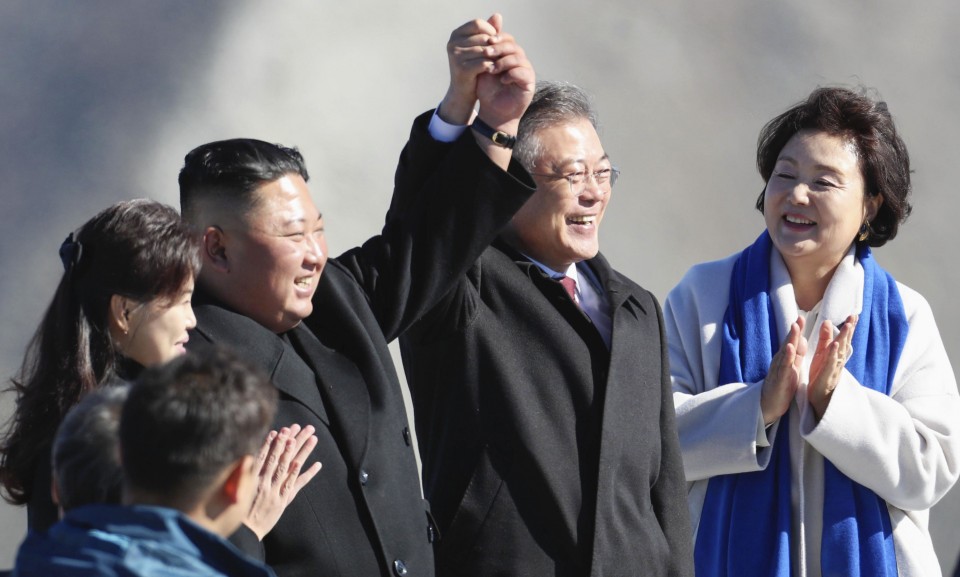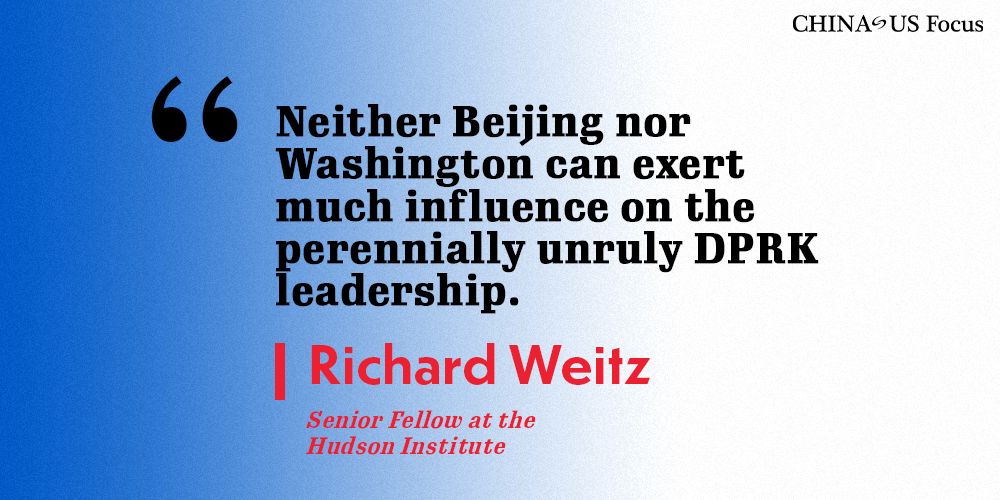
South Korean President Moon Jae In (C,R) and North Korean leader Kim Jong Un (C,L) visit Mt. Paektu, the highest peak on the Korean Peninsula on the North Korean-Chinese border, on Sept. 20, 2018. (Pyeongyang Press Corps)(Kyodo)
Despite North Korea demolishing its joint liaison office with South Korea earlier this month, the June 24 announcement by Kim Jong-un that Pyongyang will suspend its unspecified planned military actions has given the Korean peace process a temporary reprieve. The DPRK provocations of previous months included threats to fortify DPRK’s nuclear potential, a record number of monthly short-range DPRK missile launches, and the suspension of various joint confidence-building and security measures with the Republic of Korea.
The North’s public ire has been focused on the ROK government’s failure to suppress DPRK defector agitation along the border and curtail sanctions blocking major inter-Korean economic projects. Pyongyang may also be seeking to widen differences between South Korea and the United States. Internal factors—such as political manoeuvring within the ruling elite and the strain on the DPRK regime due to the COVID pandemic—may also account for Pyongyang’s incitements.
It is unclear how long the current provocation pause may last. Kim may prefer that Trump remains in office, rather than confront a new U.S. administration that, like previous new presidential teams, could discard recent negotiations, undertake a lengthy policy review, and then strike out in an entirely novel direction. Nonetheless, Chinese and U.S. policymakers must prepare for serious tensions at any time.
Whatever its causes, a breakdown in the Korean peace process will substantially damage Chinese and U.S. vital national interests. Both China and the United States have benefitted from the reduced inter-Korean relations. Most importantly, the DPRK has ceased detonating nuclear devices and launching long-range missiles. The DPRK uses nuclear weapons to extract concessions and blackmail Beijing as well as Washington.
The Trump Administration has supported ROK President Moon Jae-in’s peace initiatives while simultaneously pursuing its own diplomatic opening with Pyongyang. The June 2017 ROK-U.S. joint statement endorsed dialogue with the DPRK. The June 2018 DPRK-U.S. Singapore summit declaration also backed better inter-Korean relations. U.S. officials have argued that these and other statements, as well as U.S. policies in general, presume some kind of peace regime to facilitate disarmament and regional security.
Yet, an aggravating factor in the recent crisis has been that it has occurred during the worst deterioration of Sino-American relations since the Cold War. The escalating tensions between Beijing and Washington encourage Pyongyang to exploit these differences. At worst, they could facilitate Northern actions that lead to renewed conflict between China and the United States, 75 years after the anniversary of the onset of the Korean War.
Sino-U.S. cooperation regarding North Korea has waxed and waned over the years. In 2018, following a year of inflammatory rhetorical exchanges between Trump and Kim, Trump’s personal diplomacy combined with Chinese intervention induced Pyongyang to suspend its nuclear and long-range missile tests. Since then, PRC pressure has helped discourage the DPRK from resuming its nuclear or ICBM tests. Chinese officials have generally backed Trump’s diplomacy for reducing DPRK-U.S. tensions, but have wanted Washington to offer more incentives for denuclearization. Furthermore, though Beijing favors resuming Six-Party Talks that also include Russia and Japan, which were last conducted over 10 years ago, Washington has lost interest in the format.
During the Cold War, the PRC aligned with the DPRK as an important ideological partner. Now, some in Beijing may see the tensions between Washington and Pyongyang as helpful for distracting the Pentagon from concentrating against China, giving an advantage to the PRC in its geopolitical competition with South Korea and the United States, and as generating negotiating leverage for Beijing with both countries on many issues.

The DPRK’s actions have not yet risen to the level of previous military provocations. As recently as 2010, the North Korean armed forces bombarded the ROK’s Yeonpyeong Island and sank a ROK corvette—actions that if repeated today could lead to another war. Neither the demolition of the joint liaison office, which was located wholly on DPRK territory, nor the suspension of the Comprehensive Military Agreement nor any other Northern action last month generated any casualties on either side of the inter-Korean border.
Nonetheless, the DPRK threats have made it difficult for Moon to justify sanctions relief now without looking weak. If PRC actions lead to renewed DPRK miscalculations, there is potential for renewed armed confrontations. Unlike in 2010, the ROK military is prepared to respond to DPRK armed attacks with strong counteractions. Escalatory dynamics could trigger renewed war on the Peninsula, with the risk of dragging China and the United States into their first direct armed clash in decades.
Neither Beijing nor Washington can exert much influence on the perennially unruly DPRK leadership. Strong joint action will prove difficult due to Chinese-U.S. tensions. However, both countries can pursue parallel unilateral actions that, along with the support of South Korea and other countries, can help avert an irreparable breakdown of peace on the Korean Peninsula.
For instance, China could give the DPRK leadership more incentives to negotiate by enforcing UN sanctions against North Korea better. The UN Panel of Experts has found that some PRC authorities have been lax in impeding illicit transfers of banned goods between North Korean and foreign ships in waters near China.
Meanwhile, the United States should consider allowing expanded humanitarian relief to the DPRK to address Chinese concerns about undue suffering and instability in the DPRK due to the COVID-19 pandemic. The U.S. and other sanctions have substantially reduced ROK humanitarian aid to the North compared with earlier years.
The COVID-19 crisis has naturally focused Beijing’s and Washington’s attention on other issues. Recent events should hopefully remind Chinese and U.S. officials that, even if Kim mysteriously disappears from view for weeks on end, the threat of another Korean War does not.
